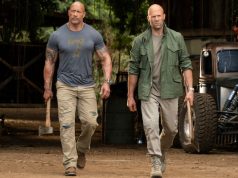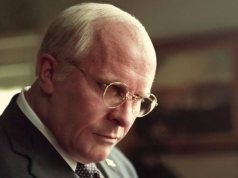And now we must walk that delicate line between honoring a biopic’s subject and criticizing the biopic. This is particularly difficult right now, in mid-December 2013, because the film is “Mandela: Long Walk to Freedom”; its subject died just a matter of days ago; and the movie is mediocre.
I wish it were otherwise. Everyone wishes it were otherwise! Based on Nelson Mandela’s autobiography, scripted by William Nicholson (“Gladiator”), and directed by Justin Chadwick (“The Other Boleyn Girl”), this is a well-intentioned but staid, tepid appraisal of the South African leader’s life. Like so many biopics before it, the film falls into the trap of reducing a great man’s life to a series of plot points made overly familiar by all the other biopics we’ve seen. For example:
– As a young lawyer in Johannesburg in the 1940s, Mandela (played with respectful zeal by Idris Elba) is doing about as well as a black man can do, and is uninterested in political activism. “When I am richer than they are, they will not call me ‘boy,'” he says of the vicious racists who surround him. But then a friend of his is beaten to death by police, and now Mandela has motivation to get involved. This may well be accurate, but the way it’s portrayed makes Mandela come across like the reluctant heroes in countless boilerplate movies who are spurred to action by a personal tragedy.
– Years pass, and Mandela becomes a rising star within the African National Congress. As is frequently the case in these matters (or at least in movies about them), his success comes to the detriment of his home life. He cheats on his wife, who one night delivers this groaner of a line to him: “You care about all the children of South Africa except your own!”
Fortunately, as the film goes on, it’s able to break free from some of these formulaic requirements, even if it never becomes truly distinguished. Mandela is sentenced to life in prison (run by an eeeee-vil warden, of course), where he refuses to give into resentment or anger. This in itself is compelling: a man who could honestly forgive his jailers and tormenters and wish nothing but peace for all people would be fascinating no matter how well the part was acted. It helps that Elba, one of the best actors of his generation, is wholly committed to bringing life and authenticity to a man he admires.
Mandela’s relationship with his second wife, Winnie (Naomie Harris), has great dramatic potential that is only hinted at by the film (which chooses to make Mandela’s political life its focus, for good reason). They’ve been married only a few years when he’s sent to prison, cutting their romance tragically short, and later they grow apart ideologically. Nelson favors pacifism; Winnie is more extreme. During a rare prison visit, he asks her how she deals with the constant harassment she receives from police and the government. Her answer: “By hating them.” Harris is steely and fierce, Elba gentle yet authoritative. If someone were to make a movie focusing specifically on Nelson and Winnie’s relationship, they would be perfect.
It is hard to overstate the positive impact Nelson Mandela had on South Africa and the world. The film, to its credit, doesn’t get sloppy or embarrassing in its affection for the man, though it mostly sidesteps his flaws, too. It’s a respectable effort at telling a vital story, but covering 50 years of Mandela’s life means glossing over many elements of it, addressing others only superficially. In the end, the positive feelings the film engenders aren’t toward it, the film, but toward him, the man.
C+ (2 hrs., 19 min.; )
Originally published at About.com.





